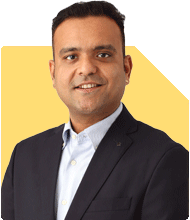Rohit Gupta | Answer |Ask -Follow
Edtech/Online Education Expert - Answered on Feb 07, 2024
Rohit is a first-generation entrepreneur who currently leads the company’s marketing and operations department.
A TEDx speaker, he was honoured with the ET Leadership Excellence Award 2022 for his effort in helping shape the lives of over 90,000 students through his platform.
Rohit is passionate about the potential of online education and is on a mission to democratise access to quality education and career opportunities.
He completed his schooling from Scholars Home in Dehradun and holds a bachelor’s degree in commerce from Deshbandhu College, Delhi.
... more

Hi,I am Anath Bandhu Gayen. I am 28 years old. My education qualification is higher secondary pass. I am working in a bank as a casual outsourcing staff (RBO-II,SBI Bank). I am learning English language. My income is 8000 rupees per month. I want to be rich what can I do?
1. Education and Skills Development: Since you're already learning English, continue to invest in your education and skill development. Consider pursuing further education or vocational training programs that can enhance your qualifications and open up better job opportunities.
2. Career Advancement: Explore opportunities for career advancement within the banking sector. Work on gaining experience, acquiring new skills, and demonstrating your value to your employer. Seek promotions or apply for higher-paying positions within your organization or other banks.
3. Side Hustles and Additional Income Streams: Find ways to generate additional income outside your primary job. This could involve starting a small business, freelancing, or investing in income-generating assets such as stocks, real estate, or online businesses.
4. Financial Management: Practice sound financial management by wisely budgeting, saving, and investing. Learn about personal finance and wealth-building strategies to maximize earnings and long-term wealth.
5. Networking and Mentorship: Build relationships with successful individuals in your field or industry who can offer guidance, support, and mentorship. Networking can open doors to new opportunities and valuable connections.
Remember, achieving financial success takes time, dedication, and constancy. Stay focused on your goals, continue to learn and grow, and be proactive in pursuing opportunities for advancement and income growth.
You may like to see similar questions and answers below
Ramalingam Kalirajan |10870 Answers |Ask -Follow
Mutual Funds, Financial Planning Expert - Answered on Jun 05, 2025
Dr Dipankar Dutta |1836 Answers |Ask -Follow
Tech Careers and Skill Development Expert - Answered on Dec 05, 2025
Ulhas Joshi |280 Answers |Ask -Follow
Mutual Fund Expert - Answered on Dec 05, 2025
Dr Dipankar Dutta |1836 Answers |Ask -Follow
Tech Careers and Skill Development Expert - Answered on Dec 04, 2025
Ravi Mittal |676 Answers |Ask -Follow
Dating, Relationships Expert - Answered on Dec 04, 2025
Anu Krishna |1745 Answers |Ask -Follow
Relationships Expert, Mind Coach - Answered on Dec 04, 2025
Anu Krishna |1745 Answers |Ask -Follow
Relationships Expert, Mind Coach - Answered on Dec 04, 2025
Mayank Chandel |2562 Answers |Ask -Follow
IIT-JEE, NEET-UG, SAT, CLAT, CA, CS Exam Expert - Answered on Dec 04, 2025
Mayank Chandel |2562 Answers |Ask -Follow
IIT-JEE, NEET-UG, SAT, CLAT, CA, CS Exam Expert - Answered on Dec 04, 2025
Mayank Chandel |2562 Answers |Ask -Follow
IIT-JEE, NEET-UG, SAT, CLAT, CA, CS Exam Expert - Answered on Dec 04, 2025
Mayank Chandel |2562 Answers |Ask -Follow
IIT-JEE, NEET-UG, SAT, CLAT, CA, CS Exam Expert - Answered on Dec 04, 2025























